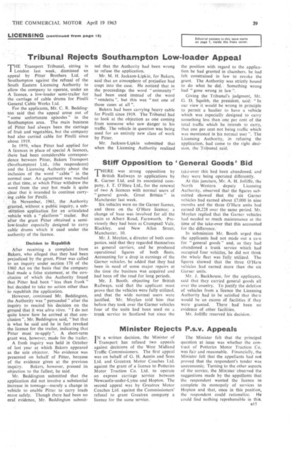Tribunal Rejects Southampton Low-loader Appeal
Page 41

If you've noticed an error in this article please click here to report it so we can fix it.
'THE Transport Tribunal, sitting in I. London last week, dismissed an appeal by .Pitter Brothers Ltd. of Southampton against the refusal of the South Eastern Licensing Authority to allow the company to operate, under an A licence, a low-loader semi-trailer for the carriage of cable drums for Pirelli General Cable Works Ltd.
For the applicants, Mr. C. R. Beddington said that the appeal arose out of "some unfortunate episodes" in the Southampton area. The main business of. Pitter had always been the carriage of fruit and vegetables, but the company had also carried cable for Pirelli since about 1919.
In 1959, when Fitter had applied for A licences in place of special A -licences, there had been considerable corresponAence between Fitter, Bakers Transport • (Southampton) Ltd., (the respondents) and the .Licensing Authority about the inelpsion of the word " cable " in the norrnal user. An agreement was reached at that time, at which 'Pitter withdrew the word from the .user but ,made it quite -clear that it intended to continue carryins ,cable for Pirelli. . .In November, 1061, the Authority . granted, without a public inquiry, a sub, stitution application for an • articulated vehicle with a " platform " trailer. But after, the grant Pitter obtained a semilow-loader especially designed to carry cable drums which if used under the 'authority of the licence.
Decision to Republish After receiving a complaint from Bakers, who alleged that they had been prejudiced by the grant, Pitter was called to an inquiry -under section-178 of the 1960 Act on the baSis that' the company had: made a false statement;-at the conclusion of which the Authority • found that Fitter had been "less than frank" but decided to take no action other than to republish the application,
However, continued Mr. Beddington, the Authority was persuaded" after the inquiry to rescind his decision on the ground that it Was ultra 1)iies. "I do not quite knOW how he arrived at that conclusion ", Mr. Beddington said, "but that is what he said and he in fact revoked the licence for the trailer, indicating that Fitter must' re-apply ". A short-term grant was, however, made for the trailer.
A fresh inquiry was held in October of last year at which Bakers appeared as the sole .objector. No evidence was presented on behalf of Fitter, because of the evidence given at the previous inquiry. Bakers, however, pressed its objection to the fullest, he said.
Mr. Beddington submitted that the application did not involve a substantial increase in tonnage—merely a change in _ vehicle to enable Pitter to carry loads more safely. Though there had been no oral evidence, Mr. Beddington submit
ted that the Authority had been wrong to refuse the application.
Mr. M. H. Jackson-Lipkin, for Bakers, said that an atmosphere of prejudice.had crept into the case. He noticed that in the proceedings the word " animosity" had been used instead of the word "vendetta", but this was "not one of those cases at all ".
Bakers. had been carrying heavy cable for Pirelli since 1919. The Tribunal had to look at the objection as one corning from someone who saw danger to his traffic. The vehicle in question was being used for an entirely new class of work by Ritter.
Mr. Jackson-Lipkin submitted that when the Licensing Authority realized the position with regard to the application be had granted in •chambers. he had felt constrained in law to revoke the grant. The Authority was strictly bound to do what he did. Something wrong had 'gone wrong in law ".
Giving the Tribunal's judgment, Mr. G. D. Squibb, the president, said: "In our view it would be wrong in principle to permit a haulier to have a vehicle which was especially designed to carry something less than one per cent of the total traffic which he intends to carry, that one per cent not being traffic which was mentioned in his normal user ". The Licensing Authority, in refusing the application, had come to the right decision, the Tribunal said.




















































































































